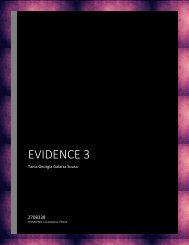Activity 6
Create successful ePaper yourself
Turn your PDF publications into a flip-book with our unique Google optimized e-Paper software.
WHAT IS<br />
HYPOTHYROIDISM?<br />
Is a condition where the thyroid gland does not create enough of a thyroid<br />
hormone called thyroxine. Thyroid hormones regulate the way in which the body<br />
uses energy - metabolism - and without enough thyroxine many of the body's<br />
functions slow down.
FAST FACTS ON HYPOTHYROIDISM<br />
Here are some key points about hypothyroidism. More detail and supporting<br />
information is in the main article.<br />
• The thyroid gland produces two thyroid hormones.<br />
• These hormones regulate the body's metabolism.<br />
• The thyroid gland is stimulated by the hypothalamus and the pituitary<br />
gland.<br />
• Hypothyroiditis can occur if the thyroid gland does not function correctly,<br />
or if it is not stimulated properly.<br />
• The most common cause of hypothyroidism in the US is Hashimoto's<br />
disease.<br />
• Symptoms of hypothyroidism include fatigue, cold intolerance and joint and<br />
muscle pain.<br />
• Pregnant women are more susceptible to hypothyroiditis as the body needs<br />
more thyroid hormones during pregnancy.<br />
• Hypothyroiditis is usually diagnosed by physical examination followed by a<br />
blood test.<br />
• Hypothyroiditis can be treated with a medicine called synthetic thyroxine.<br />
Fast facts on hypothyroidism<br />
• Hypothyroiditis can be controlled well with lifelong medication.
Here are some key points about hypothyroidism. More detail and supporting<br />
information is in the main article.<br />
• The thyroid gland produces two thyroid hormones.<br />
• These hormones regulate the body's metabolism.<br />
• The thyroid gland is stimulated by the hypothalamus and the pituitary<br />
gland.<br />
• Hypothyroiditis can occur if the thyroid gland does not function<br />
correctly, or if it is not stimulated properly.<br />
• The most common cause of hypothyroidism in the US is Hashimoto's<br />
disease.<br />
• Symptoms of hypothyroidism include fatigue, cold intolerance and<br />
joint and muscle pain.<br />
• Pregnant women are more susceptible to hypothyroiditis as the body<br />
needs more thyroid hormones during pregnancy.<br />
• Hypothyroiditis is usually diagnosed by physical examination followed<br />
by a blood test.<br />
• Hypothyroiditis can be treated with a medicine called synthetic<br />
thyroxine.<br />
• Hypothyroiditis can be controlled well with lifelong medication.
Prevention<br />
You can't prevent hypothyroidism, you can watch for signs of the disease so it<br />
can be treated promptly. Some people who are at high risk for having<br />
hypothyroidism but do not have symptoms can be tested to see whether they have<br />
mild, or subclinical, hypothyroidism.<br />
Expert groups differ in their recommendations for screening. For example:<br />
The American Thyroid Association recommends that all adults be tested<br />
beginning at age 35 and continuing every 5 years.3 Older adults, especially<br />
women older than 60, those with a family history of hypothyroidism, and<br />
those who have Addison's disease, rheumatoid arthritis, pernicious anemia,<br />
or type 1 diabetes should also be tested, according to these<br />
recommendations.<br />
The U.S. Preventive Services Task Force makes no recommendation for or<br />
against thyroid screening for people who do not have symptoms of<br />
hypothyroidism. The USPSTF states there is not enough evidence to<br />
support screening.<br />
Another panel of experts from several medical specialties recommends<br />
against widespread screening.6 but these health professionals say that if<br />
you are high risk, you may want to be screened. Those at high risk include<br />
women older than age 60 and people who have type 1 diabetes or other<br />
autoimmune diseases.6 Talk to your doctor about whether you should be<br />
screened.
HYPERTHYROIDISM AND PREGNANCY.<br />
Uncontrolled hyperthyroidism during pregnancy can lead to<br />
Congestive heart failure.<br />
Preeclampsia—a dangerous rise in blood pressure in late pregnancy.<br />
Thyroid storm—a sudden, severe worsening of symptoms.<br />
Miscarriage.<br />
Premature birth.<br />
Low birth weight.
kijklj<br />
Health<br />
&<br />
More<br />
Hypothyroidism<br />
Everything about it<br />
Hypothyroidism






